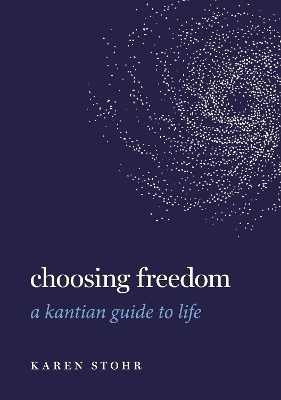
Choosing Freedom
A Kantian Guide to Life
Seiten
2024
Oxford University Press Inc (Verlag)
978-0-19-779722-8 (ISBN)
Oxford University Press Inc (Verlag)
978-0-19-779722-8 (ISBN)
- Lieferbar (Termin unbekannt)
- Portofrei ab CHF 40
- Auch auf Rechnung
- Artikel merken
An exploration of everything Kant's philosophy can teach us about being the best people we can be, from using our human reasoning to its fullest potential to being affably drunk at dinner parties.
Immanuel Kant is well known as one of the towering figures of Western philosophical history, but he is less well known for his savvy advice about hosting dinner parties. This philosophical genius was a man of many interests and talents: his famously formal and abstract ethical system is only part of his story. But Kant not only made a profound impact on how people think about big questions like how to treat one another -- he also offered wise insights on things people confront in everyday life: things like gossip, friendship, manners, self-respect, cheerfulness, gratitude, mockery, contempt, and yes, dinner parties. In this book, philosopher Karen Stohr shows how Kant's whole ethical picture fits together. It's a picture that is as relevant and useful now as it was in the 18th century--and maybe even more so.
A Kantian way of living means using reason to guide your choices so that your life reflects your true nature as a free, rational being. This nature is one we share with others; Kantianism emphasizes the fundamental dignity and equality of each person. It presents an ideal for how we should live together without downplaying the challenges we face in the actual world. Though realistic about human weaknesses, Kant remained optimistic about our capacities and possibilities. He had great faith in the ability of human reason to point us in the direction of moral progress and to get us there. Each of us has the power within us to know and choose the right path--we just have to be willing to make that choice, and to discover how worthwhile life can be in the process.
Immanuel Kant is well known as one of the towering figures of Western philosophical history, but he is less well known for his savvy advice about hosting dinner parties. This philosophical genius was a man of many interests and talents: his famously formal and abstract ethical system is only part of his story. But Kant not only made a profound impact on how people think about big questions like how to treat one another -- he also offered wise insights on things people confront in everyday life: things like gossip, friendship, manners, self-respect, cheerfulness, gratitude, mockery, contempt, and yes, dinner parties. In this book, philosopher Karen Stohr shows how Kant's whole ethical picture fits together. It's a picture that is as relevant and useful now as it was in the 18th century--and maybe even more so.
A Kantian way of living means using reason to guide your choices so that your life reflects your true nature as a free, rational being. This nature is one we share with others; Kantianism emphasizes the fundamental dignity and equality of each person. It presents an ideal for how we should live together without downplaying the challenges we face in the actual world. Though realistic about human weaknesses, Kant remained optimistic about our capacities and possibilities. He had great faith in the ability of human reason to point us in the direction of moral progress and to get us there. Each of us has the power within us to know and choose the right path--we just have to be willing to make that choice, and to discover how worthwhile life can be in the process.
Karen Stohr is the Ryan Family Professor of Metaphysics and Moral Philosophy at Georgetown University, where she is also a Senior Research Scholar in the Kennedy Institute of Ethics. She publishes in the areas of Kantian ethics, Aristotelian virtue ethics, and contemporary ethical theory, focusing especially the relationship between moral norms and social norms. Her previous books include On Manners (Routledge, 2011) and Minding the Gap: Moral Ideals and Moral Improvement (Oxford University Press, 2019). Her articles have appeared The New York Times and the Houston Chronicle, and she writes an ethics column for the Washingtonian. She has been interviewed on NPR and Philosophy Talk.
| Erscheinungsdatum | 19.09.2024 |
|---|---|
| Reihe/Serie | Guides to the Good Life |
| Verlagsort | New York |
| Sprache | englisch |
| Maße | 130 x 178 mm |
| Gewicht | 304 g |
| Themenwelt | Geisteswissenschaften ► Philosophie ► Ethik |
| Geisteswissenschaften ► Philosophie ► Geschichte der Philosophie | |
| Geisteswissenschaften ► Philosophie ► Philosophie der Neuzeit | |
| ISBN-10 | 0-19-779722-9 / 0197797229 |
| ISBN-13 | 978-0-19-779722-8 / 9780197797228 |
| Zustand | Neuware |
| Informationen gemäß Produktsicherheitsverordnung (GPSR) | |
| Haben Sie eine Frage zum Produkt? |
Mehr entdecken
aus dem Bereich
aus dem Bereich


